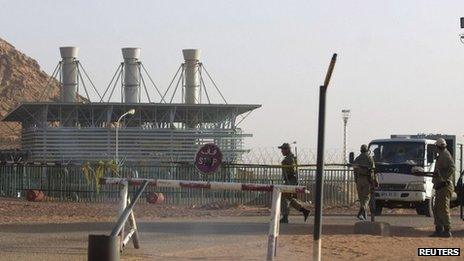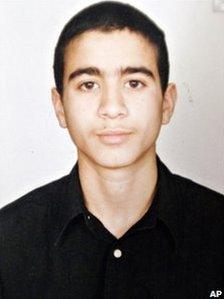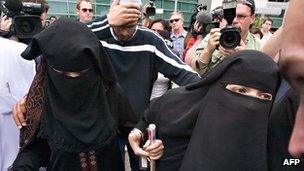Viewpoint: Canada no stranger to al-Qaeda
- Published

Canada is investigating whether two citizens were involved in the Algeria siege
After two Canadians were implicated in the hostage crisis in Algeria, counter-terrorism specialist Dr Alex Wilner assesses Canada's recent struggle with al-Qaeda-inspired militants.
Algeria announced earlier this week that two Canadian Islamist militants were among the hostage-takers in the standoff at the In Amenas gas plant in which more than three dozen foreign workers died.
Canada is investigating the claims about the men - both dead - but if confirmed the news will come as no surprise to terrorism experts.
Since 2008, when Canada's anti-terrorism legislation recorded its first conviction, there has been a steady increase in the number of terrorism-related arrests and prosecutions.
Over two dozen Canadians have been arrested or indicted on terrorism-related crimes in Canada and abroad, the vast majority inspired by al-Qaeda.
Canada's spy agency, the Canadian Security Intelligence Service (CSIS), said last year that it was monitoring 250 people suspected of being involved in terrorism, up from 200 in 2010, and it was spending just under half of its $514m (£326m) annual budget on counter-terrorism.
A "massive, massive effort" for a country with a population of 34 million people, according to CSIS Director Richard Fadden.
Arrest and detention
Since al-Qaeda's 2001 attack on the US, as many as 60 Canadians are thought to have travelled to Somalia, Yemen, Pakistan, Afghanistan and elsewhere to join militants.
Some have ended up arrested and in court.
One of the best known cases involves Egyptian-Canadian Ahmed Khadr, who travelled to Afghanistan in the 1980s and became a prominent supporter of Osama bin Laden.
One of his Toronto-born sons, Omar, was captured in Afghanistan in 2002 and detained by US forces at Guantanamo Bay before pleading guilty in 2010 to killing a US Army medic.
Another notable case was that of Ottawa native Mohammad Khawaja, who was the first Canadian charged under the country's Anti-Terrorism Act after being found guilty in 2008 of participating in a foiled Islamist plot in the UK to plant fertiliser bombs.

Omar Khadr was detained in Guantanamo Bay
There is a precedent for militancy involving Algerians: Montreal resident and al-Qaeda member Ahmed Ressam planned to bomb Los Angeles International Airport on New Year's Eve in 2000.
He was caught driving a car bomb over the US-Canada border and was sentenced to 37 years in prison.
Domestic focus
But the focus for militancy in Canada has not just been abroad - it has had an increasingly domestic focus.
In 2006, 18 men were arrested in Ontario and charged with planning large-scale attacks in and around Toronto - they had planned to detonate truck bombs in at least three locations and open fire in a crowded area.
Eleven members of the home-grown al-Qaeda-inspired group were eventually incarcerated on terror-related charges.
In 2010, Iran-born Hiva Alizadeh, India-born Misbahuddin Ahmed and Montreal native Khurram Sher were arrested on charges of conspiring to facilitate terrorism in Canada and against Canadian soldiers in Afghanistan.
Reports suggested they had managed to build more than 50 electronic circuit boards used to trigger improvised explosive devices (IEDs).
Unlike trends in British or French radicalisation, in which a large percentage of home-grown radicals trace their roots to a specific immigrant community, Canadian radicals are an especially diverse lot.
Those arrested on terrorism offences have had Arab or ethnic Persian or North African or South Asian backgrounds. Others have come from Ethiopia and Somalia.
And there have been Muslim converts as well. Radicalism in Canada particularly reflects the country's cultural mosaic.
Anger and alienation
Despite a successful, multi-cultural model, these radicals share with their US and UK counterparts a feeling of being alienated from mainstream society.

The relatives of men who were charged with terrorism in Toronto in 2006
Others are angry about Canada's involvement in the war in Afghanistan, its strong ties to the US, and its increasingly vocal commitment to Israel.
For its part, the government has shown new vigour in combating terrorism, with Prime Minister Stephen Harper saying in 2011 that "Islamic terrorism" was the country's biggest security threat.
In 2011, he launched the Kanishka Project, a five-year, $10m initiative to spur academic research on terrorism.
It was named after the Air India Flight 182 plane that was bombed on 23 June 1985 leaving 329 people dead - most of them Canadians - in the worst act of terrorism in Canadian history.
Last year, the government finally released its first counter-terrorism strategy, which shares much in common with those developed in the UK, US, and Australia.
The story unfolding in Algeria is certainly unsettling, but it is less than surprising. Canadians are no strangers to terrorism.
Dr Alex Wilner is a senior researcher at ETH Zurich and a fellow specialising in counter-terrorism at the Macdonald-Laurier Institute in Ottawa.